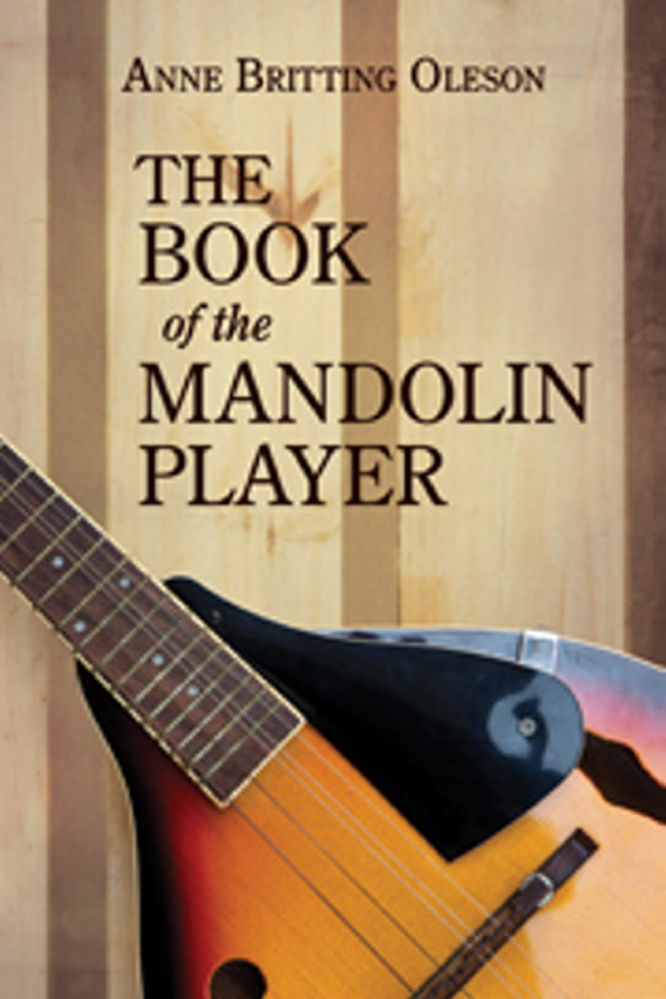Readers will feel the tug of Anne Britting Oleson’s debut novel, “The Book of the Mandolin Player,” in the first few pages. It’s done with a soft but evocative touch in introducing the two main characters, Meg and her 10-year-old niece, Maeve, who has been entrusted to her care. This is a story about the entanglements of family, and how grief and regret so often feel inescapable.
The story is that of the Crosses, a set of adult siblings whose lives, for the most part, center on Damascus, the rural Maine town where they grew up. Meg Cross, a retired schoolteacher just shy of 50, is the narrator. She and her two older brothers, Dusty and Hal, still live in Damascus. Their brother Peter, who lives in New York, is a famous actor and constant fodder for the tabloids. Sister Bella lives in Paris and is barely mentioned. And baby brother Arthur, Meg’s favorite, has a large presence but is mostly absent throughout.
Nine years earlier Arthur showed up at Meg’s door and handed her his year-old daughter, entrusting Meg to raise little Maeve. He then got back in his car and drove away. Where? God only knows. Meg embraces Maeve and raises her as if she were her own daughter – which she deeply wishes she were.
By the second page, readers will sense that Maeve will likely figure greatly in the story. Maine author and poet Oleson does not disappoint. Maeve is a worthy focus, old beyond her years, strong willed, taciturn and startlingly prescient.
When the story opens, Meg and Maeve are in the kitchen preparing for the holidays. Thanksgiving – as always – will be hosted by Dusty’s wife, Shelly. Maeve, who loves music, has put on Van Morrison’s “Beautiful Vision” CD. Just at that moment, as “Dweller on the Threshold” starts to play, Maeve announces out of the blue, “He’s coming.”
Meg doesn’t know whom she means, but is so accustomed to such odd pronouncements and Maeve’s penchant for not elaborating, that Meg doesn’t ask. “If anything described Maeve,” she thinks, “that was it. She dwelt on a threshold.” Other than Maeve’s largely unflappable reserve, the Crosses are a big, messy family with permeable personal boundaries. Shelly is the worst, believing she’s entitled to be in everybody’s business. She constantly criticizes absent Arthur for giving Maeve to Meg to raise, reminding Meg repeatedly that she doesn’t know a thing about being a mother, having never had kids. This is a painful subject for Meg, as she had once been married, but her husband left her because she couldn’t conceive. Meg, however, is a fierce warrior mother when it comes to Maeve.
Though Meg is private and guarded about who she lets into her life, she secretly harbors an interest in Will Ledbetter, the nice-to-look-at single minister at the local church. He is also a skilled mandolin player who comes to the house to teach Maeve how to play. Maeve is passionate about the mandolin, but also deftly plays her hand as a matchmaker.
Oleson’s novel is richly complex, especially in probing the workings of relationships – between women and men, family and friends, and adults and children. But also wondrously so toward the end, between women and women and the idea of what constitutes family.
When a tragedy occurs, midway through the book, it is so totally unexpected and distressing that it momentarily threatens to overpower the story. Readers are forced to recalibrate their expectations about the book, as if the story they’d come to expect wasn’t the story at all that they were going to get. It totally recasts the world the Crosses inhabit, especially for Meg.
“The Book of the Mandolin Player” is a penetrating look at guilt and blame, and the dangers of hardening oneself against forgiveness. It shows how the hardest thing to do can be coming to understand that what happens in life may be nobody’s fault – and how difficult it can be to find the grace to forgive oneself.
If there is a flaw in this haunting story, it’s that the author overwrites the transition between the two halves of the book, where less would have been more.
Still, “The Book of the Mandolin Player” is deeply affecting on so many levels that it is difficult to shake the story from mind. Anne Britting Oleson’s soft touch and strong storytelling make this an exceptional debut novel.
Frank O Smith is a Maine writer and ghostwriter whose novel, “Dream Singer,” was named as a finalist for the Bellwether Prize, created by best-selling novelist Barbara Kingsolver. Smith can be reached via his website, frankosmithstories.com
Send questions/comments to the editors.



Comments are no longer available on this story